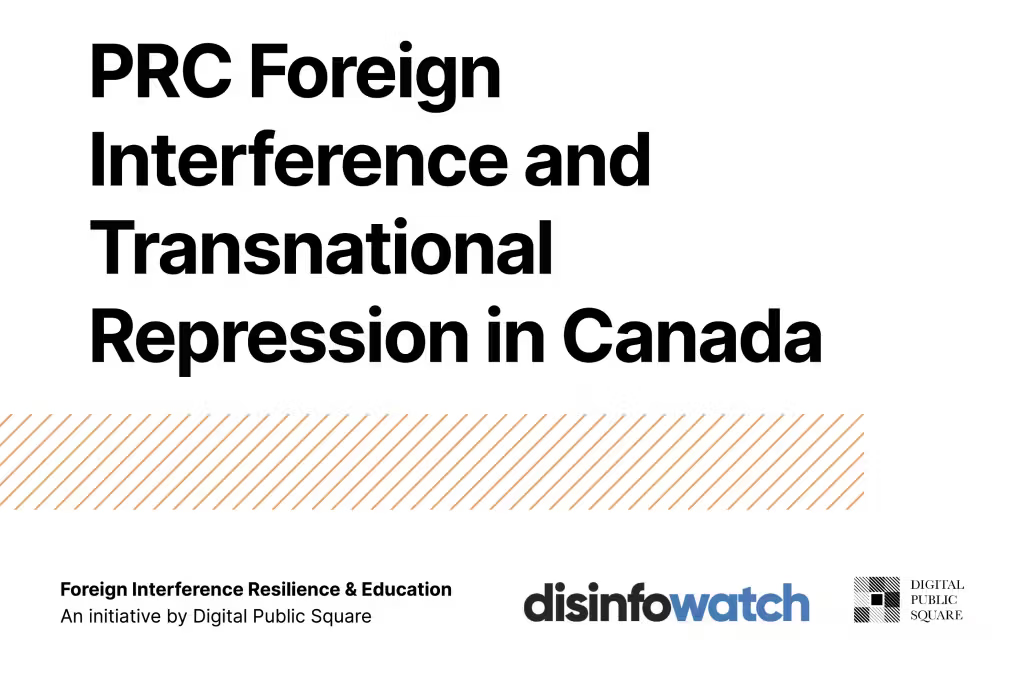Download the full report here. If you have been affected by foreign interference you can find support resources and share your story with us at fire.digitalpublicsquare.org.
Executive Summary
This report examines the People’s Republic of China’s (PRC) interference in Canada, focusing on its efforts to disrupt democratic processes, violate sovereign information spaces, and carry out transnational repression (TNR) in Canada against communities, groups, and individuals who are critical of PRC policies. Drawing on insights from leaders of Canadian Uyghur, Tibetan, Hong Kong, Taiwanese, and Falun Gong communities, it highlights Beijing’s use of intimidation, disinformation, and diaspora manipulation to advance its authoritarian agenda and silence critics.
The PRC’s transnational repression and foreign information manipulation and interference (FIMI) campaigns are a significant threat to Canada. Through TNR, the PRC targets activists, diaspora leaders, and critics of its regime with harassment, intimidation, and surveillance. These tactics often involve threats against family members in China, online harassment, and the use of platforms like WeChat to monitor and coerce individuals in Canada. The pervasive nature of these operations creates an atmosphere of fear, undermining the freedom and security of targeted communities.
Beijing’s FIMI operations aim to influence public opinion, discredit critics, and promote favorable narratives about China. By leveraging state-controlled media and social media applications, diaspora-targeted propaganda, and coordinated disinformation campaigns, the PRC seeks to undermine Canadian democratic values and violate our cognitive sovereignty by manipulating our collective understanding of PRC efforts to suppress ethnic minority rights, cultures, and basic human rights.
Central to the PRC’s strategy is the United Front Work Department (UFWD), a powerful agency tasked with influencing overseas Chinese communities and advancing the Chinese Communist Party’s (CCP) objectives. Through cultural associations, media collaborations, and grassroots infiltration, the UFWD amplifies pro-China narratives, suppresses dissent, and aligns diaspora groups with the CCP’s agenda. This sophisticated network enables Beijing to carry out influence operations while masking its role behind ostensibly independent organizations.
Despite efforts to address these challenges, significant gaps remain in Canada’s policy and enforcement responses. While measures like Bill C-70 and the Foreign Influence Transparency and Accountability Act (FITAA) represent progress, they are limited by a lack of clear definitions for foreign interference and TNR. In addition, enforcement challenges and fragmented response frameworks hinder Canada’s ability to effectively counter these covert operations.
To address these threats, the report makes recommendations to strengthen legislation and community resilience. Clear definitions of foreign interference and TNR are essential for creating effective legal tools to identify and disrupt these activities. A comprehensive kill chain framework is proposed to systematically counter PRC operations, enabling government, law enforcement, civil society, and Canada’s democratic allies to both individually and collaboratively address threats at every stage of their development and execution.
Support for vulnerable communities is equally critical. Enhancing digital security training, providing accessible law enforcement reporting mechanisms, and establishing networks to support victims of TNR are necessary steps to empower and defend those targeted by Beijing’s tactics. Coordination and partnerships with civil society organizations and community groups are critically important to helping prevent, disrupt, and deter TNR and FIMI operations targeting Canadians.


